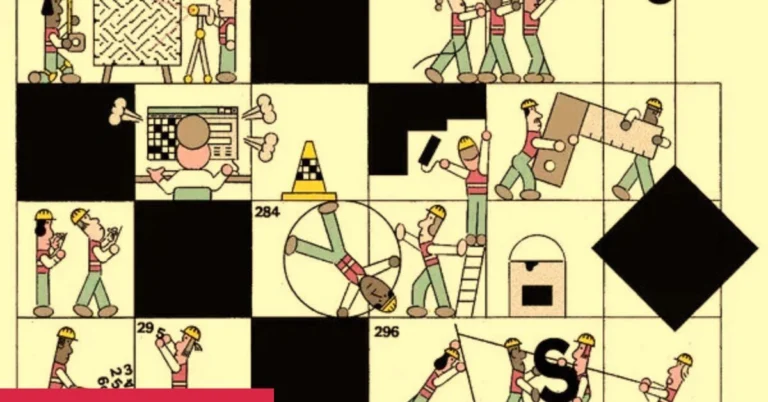The world of games has evolved, reaching beyond the confines of traditional gameplay and influencing various aspects of society, including language. One such example is the role of openly confesses nyt crossword in popular culture, especially in the realm of crossword puzzles. The term itself has sparked curiosity and conversation, serving as a significant anchor in a larger discussion about how games, puzzles, and linguistics intertwine. This article explores the influence of “openly confesses nyt crossword” and the broader impact of games on language.
Understanding the Role of Crosswords in Popular Culture
Crossword puzzles have long been a staple of many people’s daily routines, often featured in newspapers or digital platforms. These puzzles engage readers intellectually, offering a mix of wordplay, trivia, and problem-solving. However, when we talk about specific phrases such as “openly confesses nyt crossword,” it’s important to consider the broader implications of the clues and answers used in these puzzles.
“Openly confesses” as a clue in the NYT crossword refers to a specific action or behavior that, once uncovered, highlights the puzzle’s deeper cultural insights. This form of wordplay has been a long-standing tradition in crosswords, with clues often providing a subtle commentary on society’s values, norms, and language. The phrase “openly confesses” may seem straightforward, but in the context of the crossword puzzle, it opens up a world of linguistic exploration and creativity.
The Impact of “Openly Confesses Nyt Crossword” on Language
In many crossword puzzles, especially those published by major outlets like the New York Times, the answers to clues often shape how players think about certain words or concepts. The phrase “openly confesses nyt crossword” may not only provide a direct solution but also impact the way people understand the notion of confession, vulnerability, and public acknowledgment.
For example, when a clue like “openly confesses nyt crossword” appears, solvers are invited to engage in both a cognitive and emotional process. The clue invites players to consider the emotional weight of confession, the implications of openness, and how language can be used to express such personal moments. Whether it’s a lighthearted answer or a profound revelation, the role of confession in these crosswords subtly influences how we communicate in real life.
The Intersection of The Game and Language

The Game, a viral cultural trend, has also contributed significantly to the evolution of language, particularly in its use of phrases like “openly confesses nyt crossword.” In this context, The Game refers to a mental challenge where individuals are constantly playing a game that they’re not allowed to consciously think about. If you think about The Game, you lose. This paradoxical rule has made its way into common speech and even into crossword puzzles, where references to The Game appear as clever, cryptic clues.
“Openly confesses nyt crossword” can be seen as a metaphorical reflection of The Game’s challenge. The puzzle’s nature mirrors the difficulty of avoiding the game’s mental trap—once you think about The Game, you’re forced to confess that you’ve lost. It’s this type of wordplay that shows the linguistic overlap between gaming culture and puzzle-solving.
The Evolution of Crossword Puzzles and Their Cultural Relevance
Crossword puzzles have undergone significant changes since their inception, evolving from a niche intellectual activity to a global cultural phenomenon. While the puzzles themselves have grown in complexity, so has their relationship to pop culture, political discourse, and even gaming. The phrase “openly confesses nyt crossword” serves as an example of how crosswords can function as cultural mirrors, reflecting trends and shifts in society.
In recent years, crossword constructors have become more adventurous, weaving contemporary terms and trends, such as “openly confesses nyt crossword,” into their clues and answers. This not only reflects the changing nature of language but also shows how crossword puzzles adapt to the zeitgeist. When you encounter a phrase like “openly confesses,” it is not merely a linguistic exercise; it also invites solvers to engage with current societal norms and ideas.
How “Openly Confesses Nyt Crossword” Reflects the Puzzle’s Dual Nature
One of the unique features of crossword puzzles, especially in major outlets like the New York Times, is their ability to combine both the analytical and creative aspects of language. “Openly confesses nyt crossword” may seem like a simple phrase, but its inclusion in a crossword puzzle often invites deeper exploration.
The dual nature of crosswords, where clues challenge solvers to think both logically and creatively, is evident in how phrases like “openly confesses” play out. A solver who approaches the puzzle with only a logical mindset might overlook the emotional or social significance of the clue. However, someone who embraces both analytical and creative thinking might see the deeper connection between confession and vulnerability, further enriching their experience.
Crosswords as a Reflection of Social Movements
Language is fluid, and crossword puzzles serve as a reflection of the times. Over the years, certain phrases or clues have emerged as reflections of social movements or cultural shifts. For instance, “openly confesses nyt crossword” might have particular relevance in the context of discussions about mental health, personal identity, or even the growing importance of emotional transparency in society.
The ability of crosswords to evolve with social movements is a testament to their relevance in everyday life. The puzzles become more than just word games; they become tools for reflecting on and participating in broader cultural conversations. By incorporating clues like “openly confesses,” crossword constructors are contributing to the normalization of vulnerability and openness in language.
The Game and Language Games in Crosswords

The phenomenon of The Game and its connection to crossword puzzles is an interesting point of discussion. As players engage in The Game, they constantly try to avoid thinking about it, but the more they try not to think about it, the more they are compelled to do so. This paradoxical element is reflected in crossword puzzles, where certain answers may serve as an unintended confession.
“Openly confesses nyt crossword” can be interpreted as a puzzle within a puzzle. Just as The Game operates on a set of paradoxical rules, crossword clues often require solvers to confront contradictions in their thinking. The challenge of solving a crossword puzzle becomes an experience where one is forced to acknowledge both their mistakes and victories in a public manner, mirroring the act of confession itself.
Why Puzzles Like “Openly Confesses Nyt Crossword” Are Important
Puzzles like “openly confesses nyt crossword” are essential not just for entertainment but also for their educational value. They encourage individuals to think critically, solve problems, and engage with language in new ways. These puzzles introduce solvers to new vocabulary, cultural references, and even philosophical concepts. The inclusion of “openly confesses” is a small yet powerful example of how language, gaming, and culture intersect in meaningful ways.
By engaging with puzzles, solvers are also exposed to the subtleties of language and the way words can evoke certain emotions or ideas. The very act of solving these puzzles requires a blend of cognitive skills, making it an intellectual pursuit that promotes mental agility and adaptability.
Conclusion
The phrase “openly confesses nyt crossword” serves as a fascinating point of intersection between crossword puzzles, games, and language. As we see in both The Game and the realm of crosswords, language constantly evolves, influenced by the dynamics of gaming culture, social trends, and intellectual exploration. The act of confession, vulnerability, and the puzzles we solve represent more than just linguistic challenges—they are windows into our societal values, personal identities, and collective experiences.
Crossword puzzles like those in the New York Times exemplify the power of language to challenge and entertain. They show how phrases like “openly confesses nyt crossword” transcend their puzzle origins, becoming part of the larger cultural conversation. Whether it’s a clever twist on words or a deeper reflection on personal experiences, puzzles continue to impact the way we communicate, think, and understand the world around us.
Read more: NYT Mini Crossword Clues A Quick Dive Into the Game



